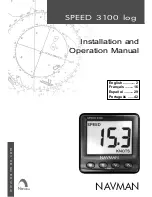
Mode 1 Operation: Master Intensity on 1 DMX Channel
Mode 1 is the simplest operational mode, using only a single DMX channel, corresponding to the
base address selected by the three address switches. The data on that DMX channel will control the
intensity of the output from the unit, with a zero level producing no output, and a maximum level of
255 producing maximum output from the unit. Manual mode operation, as described later in this
document, is only available when the unit is set to Mode 1.
Mode 2 Operation: Master Intensity plus Strobe on 2 DMX Channels
Mode 2 allows control of both Intensity and Strobe rate, and uses two DMX channels beginning
with the base address selected by the address switches. The data on the first DMX channel will
control the intensity of the output from the unit, with a zero level producing no output, and a
maximum level of 255 producing maximum output from the unit. The data level on the second
DMX channel will control the flash or strobe rate of the unit, with a zero level producing a one
second flash every other second, with a maximum flash rate of around 30 flashes per second at a
data level of approximately 245. Data levels from 245 to the maximum of 255 will result in
continuous operation. Manual operation, as described later, is not available in Mode 2.
Mode 3 Operation: 3 Bank Intensity on 3 DMX Channels
Mode 3 allows individual control of Intensity for each of the three banks of 16 LED devices
installed in the unit. This mode uses three DMX channels beginning with the base address selected
by the address switches. The data on the first DMX channel will control the intensity of the LED
devices in Bank 1, with a zero level producing no output, and a maximum level of 255 producing
maximum output. The data levels on the second and third DMX channels will control the output of
the LED devices in Banks 2 and 3 in a similar manner. This mode is most commonly used with a
mixture of LED dispersions, wavelengths, or with banks of UV and White LED’s. Manual
operation, as described later, is not available in Mode 3.
Mode 4 Operation: Master Intensity plus 3 Bank Intensity on 4 DMX Channels
Mode 4 allows individual control of Intensity for each of the three banks of LED devices installed
in the unit, plus a master level control. This mode uses four DMX channels beginning with the base
address selected by the address switches. The data on the first DMX channel will control the
intensity of all LED devices in all banks, with a zero level producing no output, and a maximum
level of 255 producing maximum output, up to the levels set by the individual bank controls. The
data levels on the second, third, and fourth DMX channels will control the output of the LED
devices in Banks 1, 2, and 3 in a similar manner. This mode is most commonly used with a mixture
of LED dispersions, wavelengths, or with mixed banks of UV and White LED’s. Manual
operation, as described later, is not available in Mode 4.






























